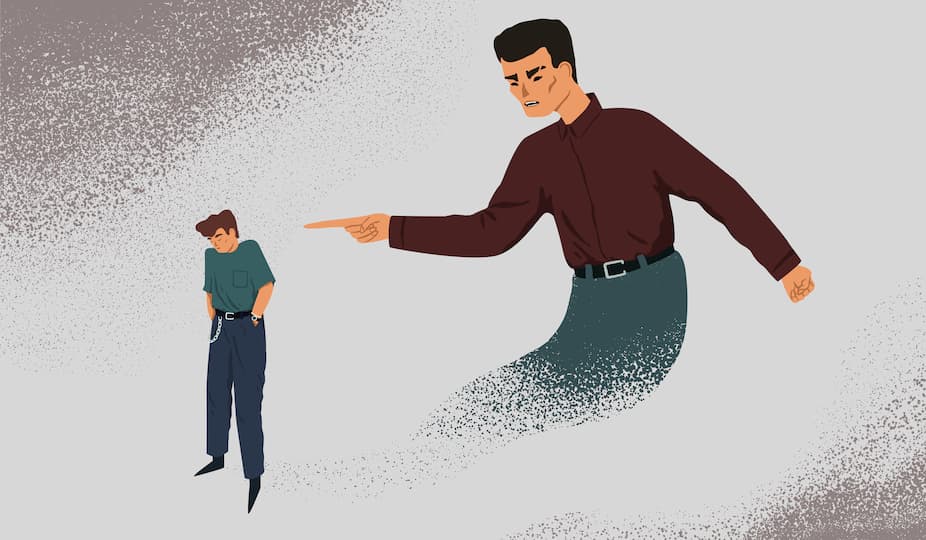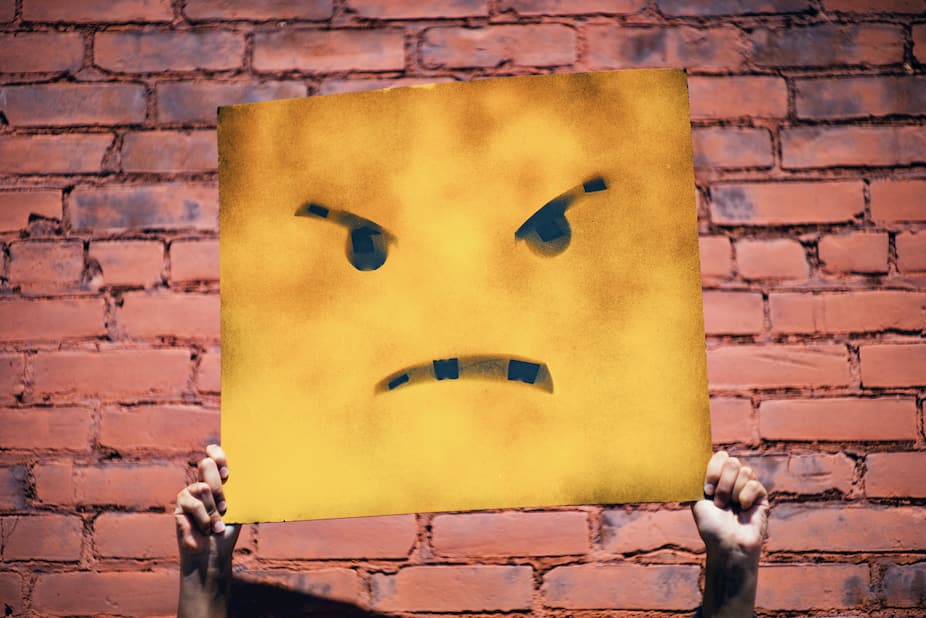
Have you ever noticed an inner voice that pipes in with comments, commentary, thoughts and incessant chatter?
Sometimes, our inner voice is harmless and at best, useful. Unfortunately, on other occasions, this inner voice is not so useful and would be better described as the “inner critic”.
Where does our inner critic come from?

When we are children we are like sponges, soaking up our environment and learning the way of the world. As children, we learn so much, so quickly.
Sadly, some of what children learn can be unhelpful and even destructive.
For some of us, our inner critic may have been influenced by the conditioning that we experienced when we were younger. In other words, some of the critical or judgemental (or even shaming) comments we heard when we were growing up may form part of our inner critic.
Even if we describe our upbringing as positive, surrounded by caregivers and teachers with the best intentions, we may have still soaked up some of the more critical voices we heard – and even worse, believed them to be true.
Some of these voices or moments may have shaped our inner critic: a heartless voice that ridicules, criticises and shames us for things we think, do and believe.
How to know when your inner critic is in control
1. Your inner critic becomes very loud!

Often the inner critic becomes so loud and critical, we end up feeling worse about ourselves given any situation we are in. The inner critic is often the loudest when we are under stress and pressure.
2. You strive for perfection and beat yourself up for not achieving it.

You find yourself saying things like:
- "What if I lose my job and we can’t afford our mortgage? If only we had enough savings, we wouldn’t be in this position now. We will never get back to where we were financially and it’s all my fault. I’ve let everyone down. I’m a failure."
- "I’m a bad mum/dad/partner. I’m stressed and angry all the time, and even drinking more. I just can’t handle it. What sort of role model/partner am I?"
- "Everyone else seems grateful and happy for more family time and all I feel is stressed and unhappy. Maybe I don’t deserve to be happy?"
- "I’ll be stuck in this job forever because of the recession. I’m so stupid for not re-training earlier. Even more stupid for not getting a qualification when I was younger."
3. Being critical and judgemental about what you say and do.

Imagine you have snapped at your children, partner or friend after a long day. Maybe you’ve been snapping more lately because you’re worried you might lose your job or overworked because your company has let other people go.
In times of stress, we often react poorly to situations more than we usually would. This is normal and to be expected. However, it’s what comes next that can send us straight into self-blame and be at the mercy of our inner critic.
When you blame yourself for your actions and think you’re a bad person, mum, dad or partner this is when your inner critic is in control. You are likely to say things like “I’m such a bad father, I always snap” or “I’m not good enough for my partner, I always take my anger out on them”.
When our inner critic is not in control, we might feel ashamed for snapping, which is healthy, but we are able to separate our reaction from who we are as a person.
For example, you can apologise to the person you snapped at and let it go, knowing that it was a long day and you’re human.
4 strategies to help you take control of your inner critic
It is normal to have an inner voice commentating on the moments in our lives. However, you can take back some of the power your inner critic has over your thoughts, feelings, and behaviour by using the following strategies.
Taking back some control can help you maintain or strengthen your emotional resilience and feel more empowered to process everyday situations – even challenges.
1. Notice and label

To take back some of the power over your inner critic, you must be aware that it is there!
Next time you notice the critical inner voice, stop and label it. You could name it if this appeals to you or simply say “hello inner critic” or “that’s my inner critic onboard”.
To some, it might seem silly to talk to yourself.
Yet, noticing that your inner critic is on board – and labelling it – means you have made the incredibly important first step to overcoming it.
2. Recognise your inner critic isn’t always right

The not so funny thing about our inner critic, is that even if we develop the ability to notice when it is there, we sometimes continue to believe what it tells us is the ultimate truth.
Try to remind yourself that not every thought is true, nor does every thought have value.
This can be particularly important when your inner critic hops on board during a challenging situation. On these occasions, it can be difficult to filter our thoughts.
For example, if you worry about losing your job, you may experience concern over being able to afford your mortgage repayments.
This is a valid concern, but if you listen to your inner critic it may be unhelpful or even downright destructive.
For example, when it comes to concern about finances, listening to your inner critic can be a contributing factor to developing harmful financial anxiety.
Your inner critic might say things like:
- “I won’t be able to get another job. I’m not smart, qualified or young enough.”
- “If I can’t work, I can’t support my partner or children or pets. What use am I?”
- “Well, if only you had saved more when you were younger, you wouldn’t be in this position now. What a joke you have become.”
The list goes on.
The trick to filtering any experience with your inner critic is to identify that your inner critic voice is present, remind yourself that it’s not always right to identify that it may not be correct and identify your emotional response to these thoughts.
Emotions arising from the harshness of your inner critic can include, guilt, shame, anxiety, hopelessness, and sadness. All of these emotions make any situation much more difficult to work through.
Hopefully, once you become aware of your emotional responses you can then start to prioritise the inner thoughts that are supportive and wise., which is much more helpful during a challenging situation.
3. Supportive statements are vital to challenge your inner critic

You can address and challenge your inner critic by speaking to yourself in a supportive way.
This can be easier said than done because we often spend more time supporting others than ourselves.
For instance, what would you do if you noticed a child being verbally bullied by another child? Would you say or do something?
The chances are, you are unlikely to believe what the bully is saying or think that the victim deserves such treatment. You are also likely to want to do something to stop the bullying.
Yet, this is not how we usually respond to our inner critic. We listen to it. We believe it’s true and maybe even that we deserve the criticism.
One way to change this response is to imagine that your inner critic is the bully.
Step in and do something about it. Fight your inner critic with self-kindness, rather than believing that voice as truth.
If you are feeling sad, down or ashamed (just to mention a few emotional responses to an inner critic) don’t beat yourself up more. Respond like a loving parent, friend or sibling and support yourself with positive statements.
Supportive statements like these may help you take a step closer to disarming your inner critic:
- “This is such a stressful time. It is okay to be feeling worried, confused and angry, but you’re not a failure. You’re human.”
- “I know that you feel awful and I understand why you feel the way you do, but I’m here for you.”
- “You’re not a bad person when you make mistakes, say the wrong thing or not always perform to a high standard. We cannot be perfect and perfectionism will only increase my anxiety.”
- “I may not always love how I look, how much I earn, that I’m aging or not where I thought I would be in life, but I can practice self-compassion, self-acceptance and commit to learning each day.”
4. Mindfulness can help
Practicing mindfulness can be another useful way to help challenge your inner critic.
Watch this short video to see how mindfulness can bring awareness to our inner critic, or as you will see in the video, the red wolf.

If you’re ready to jump straight into mindfulness, here’s a 1-minute video on how.

You might even like to try practicing some self-compassion. It is becoming more well-known that having self-compassion is a critical tool for developing greater resilience, our ability to withstand and overcome challenges in our lives.
How to remain in control of your inner critic
To really overcome our inner critic, you need to build a strong, wise, and compassionate voice inside of you.
Without this, you will be thrown around like a plastic bag in the wind when strong emotions, negative thoughts, and stressful times arise.
The quickest and most effective way to do this is through professional guidance and coaching.
Just as an athlete would hire a coach to perform at their best, a psychologist who is trained in matters of emotions and the mind can help you to develop your inner critic coach.
About the author: Louise is a psychologist, speaker, mediator, and workshop facilitator with over eight years in the psychological and consulting industry. She has a Bachelor and Master in Psychology, and has worked with hundreds of clients and delivered national programs on anxiety, emotional intelligence, mindfulness and meditation. Louise tailors her approach to the individual and uses evidence-based approaches and strategies to help her clients live a more meaningful life, find joy when that doesn't feel possible, and a sense of calm when anxiety and stress take over.
